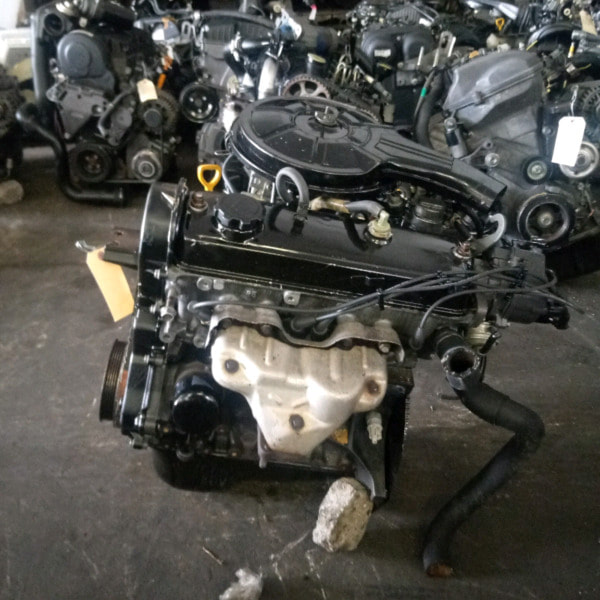Improve Your Driving Experience with Toyota Tazz Engine for Sale
Improve Your Driving Experience with Toyota Tazz Engine for Sale
Blog Article
Engine Purchasing Specialist Tips on Picking the Right Engine for Your Specific Needs
Selecting the appropriate engine for your certain requirements includes a complex interplay of aspects that go beyond mere horsepower figures. By diving into the complexities of power versus effectiveness, evaluating fuel ratings, and budgeting for long-lasting costs, one can absolutely enhance their engine selection.
Power Vs. Efficiency: Finding the Balance

When choosing an engine, it is vital to strike a balance between power and effectiveness to satisfy your details requirements efficiently. Power refers to the engine's capacity to generate energy for propulsion, determining variables like velocity, hauling capacity, and total efficiency (Toyota Tazz Engine For Sale). On the other hand, efficiency connects to exactly how well the engine utilizes fuel to produce power, impacting variables such as fuel economic situation and ecological friendliness
Achieving the appropriate balance in between power and efficiency is crucial since an engine that is as well effective may eat excessive fuel, resulting in greater operating expense and unnecessary stress on the environment. On the other hand, an engine that prioritizes efficiency over power might result in slow-moving performance, particularly in demanding circumstances like towing hefty tons or driving uphill.
To make an educated decision, take into consideration elements such as your typical driving problems, the desired use the automobile, and your individual preferences. By evaluating your requirements and concerns, you can pick an engine that strikes the perfect balance in between power and effectiveness, guaranteeing ideal efficiency while minimizing ecological impact and operating prices.
Recognizing Engine Size and Type

Additionally, engine type plays an important function in determining the efficiency characteristics of an engine. Typical engine kinds consist of inline engines, V engines, and rotating engines, each with its distinct benefits and drawbacks. The engine kind influences factors such as the engine's dimension, weight distribution, and power shipment. Understanding the interplay in between engine dimension and kind is important in selecting an engine that aligns with your specific requirements and priorities, whether it be power, performance, or an equilibrium of both.
Consider Your Car's Requirements
If you are looking for an engine for a sturdy vehicle that will be used for towing, you will certainly require an effective engine with high torque capabilities. On the other hand, if you are selecting an engine for a small auto primarily made use of for city travelling, gas performance may be a more essential factor to consider.

Examining Fuel Performance Scores
Examining fuel performance scores is a critical element of choosing the appropriate engine for your lorry, making certain cost savings and ecological sustainability. Gas effectiveness ratings, commonly determined in miles per gallon (MPG) for fuel engines or kilowatt-hours per 100 miles (kWh/100 miles) for electric engines, suggest exactly how far a lorry can take a trip on a certain quantity of fuel or electrical power. Greater MPG or reduced kWh/100 miles values signify a lot more efficient engines, converting to minimized fuel prices and lower carbon emissions.
In addition, compare various engine alternatives within the same lorry class to identify the most affordable choice. Aspects such as engine dimension, weight, aerodynamics, and hybrid or electric capabilities can all affect fuel effectiveness.
Budgeting for Long-Term Prices
Tactically intending for long-term expenditures is important when picking an engine, making certain financial sustainability over the car's life-span. While the first purchase cost of an engine is a significant aspect, it is important to take into consideration the lasting costs related to upkeep, repair services, and gas intake. Opting for a more fuel-efficient engine may have a higher in advance cost yet can cause substantial cost savings in time. Routine maintenance, such as oil modifications, filter replacements, and tune-ups, is important to keep the engine running smoothly and efficiently, decreasing the risk of costly repair work down the line.
Furthermore, looking into the availability and expense visit of replacement parts for the chosen engine is crucial in budget preparation. By thoroughly budgeting for these long-term costs and factoring them right into the decision-making process, people can choose an engine that not just fulfills their instant requirements yet also stays cost-efficient throughout its lifespan.
Verdict
To conclude, selecting the right engine for your particular demands calls for balancing power and efficiency, recognizing engine dimension and kind, considering your vehicle's requirements, examining gas performance ratings, and budgeting for long-term expenses. By thoroughly thinking about these factors, you can guarantee that you select an engine that meets your requirements and offers optimal efficiency for your lorry.
To further refine the selection procedure of an engine that strikes the ideal balance in between power and efficiency, it is crucial to delve into the intricacies of understanding engine size and kind. Engine size refers to the overall quantity of air and fuel that can be pushed through the engine cylinders. Common engine types consist of inline engines, V engines, and rotary engines, each with its special important site benefits and downsides. Understanding the interplay between engine size and kind is important in choosing an engine that straightens with your details demands and priorities, whether it be power, effectiveness, or an equilibrium of both.
Gas efficiency rankings, generally measured in miles per gallon (MPG) for fuel engines or kilowatt-hours per 100 miles (kWh/100 miles) for electrical engines, indicate how far a lorry can travel on a particular quantity of gas or electrical energy.
Report this page